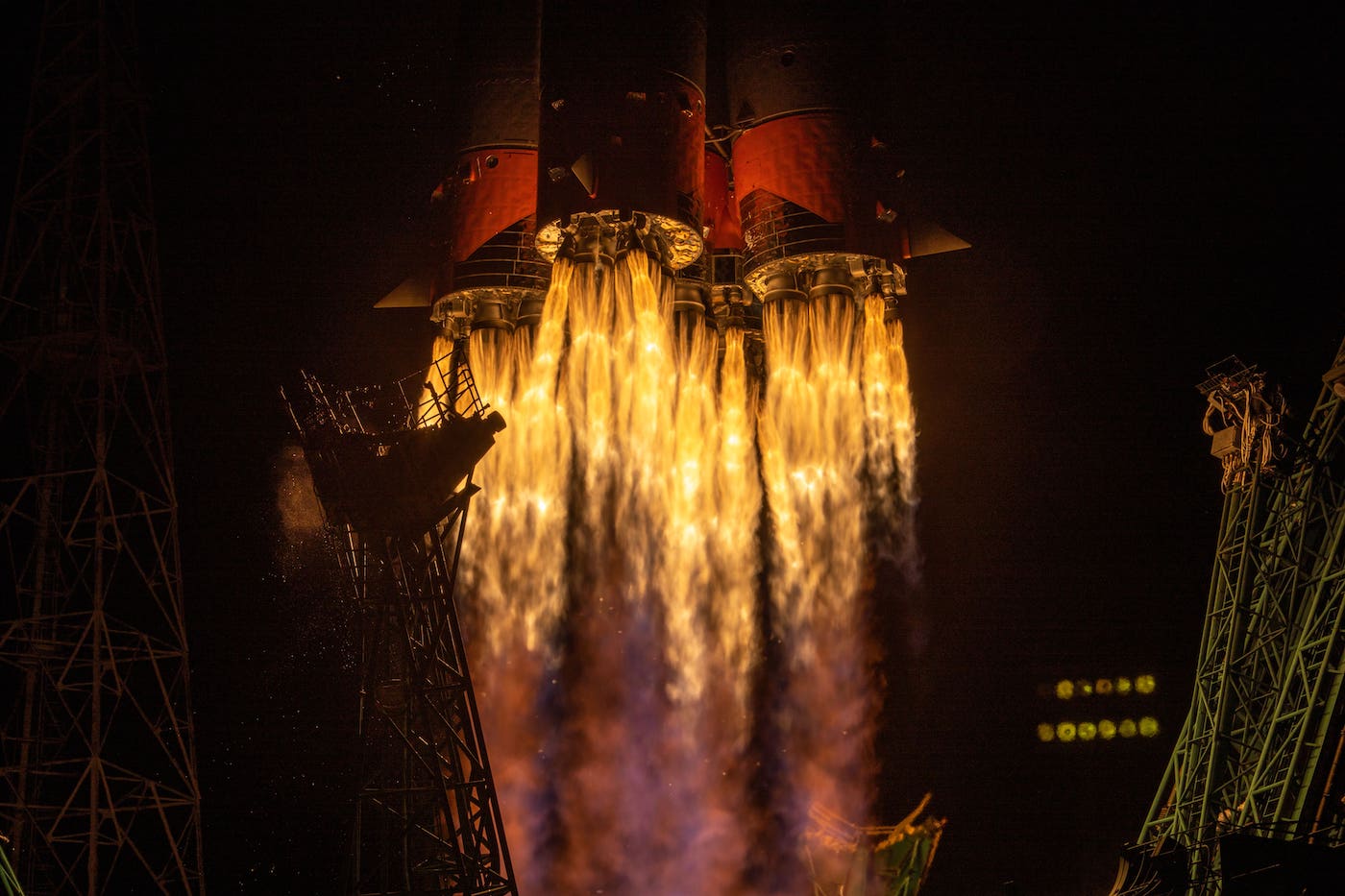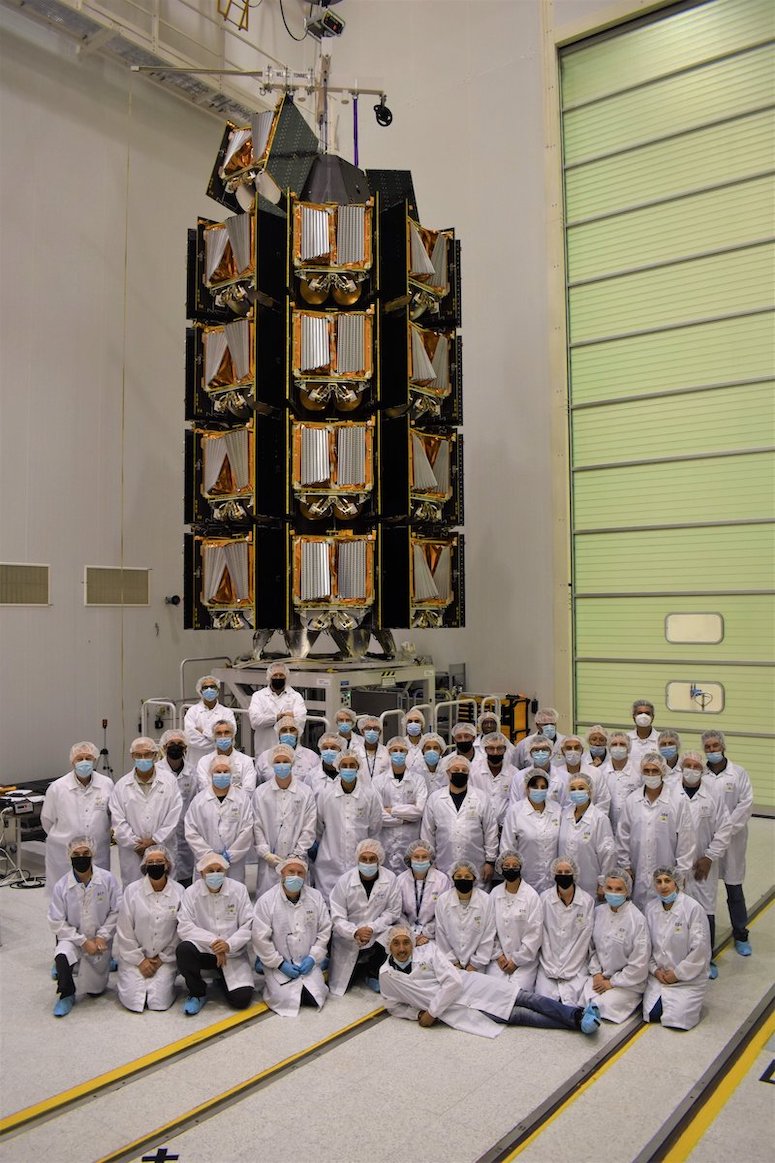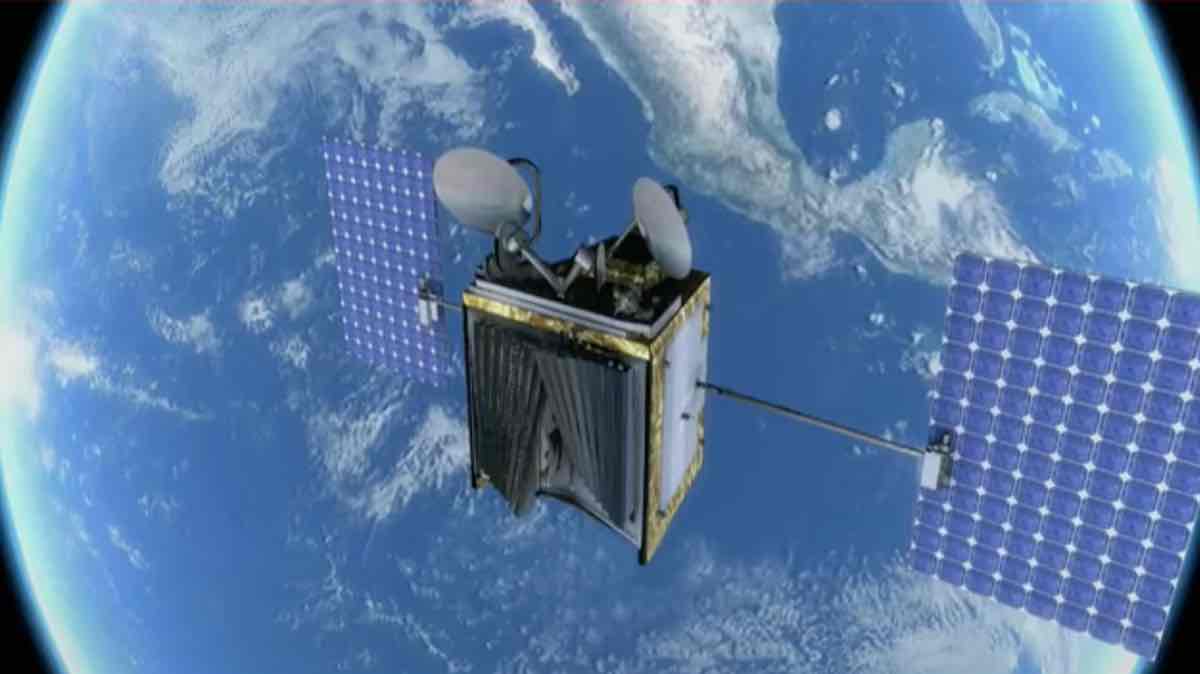
Another 34 satellites for OneWeb’s internet network successfully launched on a Russian Soyuz rocket Saturday from the Baikonur Cosmodrome in Kazakhstan, giving the UK-based company a fleet of 288 spacecraft.
The latest batch of OneWeb satellites, manufactured in an assembly line factory on Florida’s Space Coast, took off from Baikonur aboard a Soyuz-2.1b rocket at 6:13:40 p.m. EDT (2213:40 GMT) Saturday.
The Soyuz rocket’s four kerosene-fueled boosters and core stage powered the launcher off the Site 31 complex at Baikonur with nearly a million pounds of thrust.
Two minutes after liftoff, the Soyuz shed its four first stage boosters to fall into a drop zone north of Baikonur. Nearly five minutes into the mission, the rocket jettisoned its core stage and ignited a third stage to continue the climb into orbit. Moments later, the Soyuz released its two-piece clamshell payload fairing after ascending above the dense, lower layers of the atmosphere.
The Soyuz third stage shut down as planned more than nine minutes after liftoff, and deployed a Russian-made Fregat upper stage to conduct a pair of main engine burns to reach a planned polar orbit 280 miles (450 kilometers) above Earth.
The Fregat apparently completed those burns as planned, delivering the 34 satellites to the expected altitude.
“Orbit injection seems perfect,” tweeted Massimiliano Ladovaz, OneWeb’s chief technical officer.
Liftoff of a Soyuz rocket from the Baikonur Cosmodrome with the next group of 34 Florida-built spacecraft for OneWeb’s growing fleet of internet satellites. https://t.co/UlQw0HqjWN pic.twitter.com/IkaqJYt9yG
— Spaceflight Now (@SpaceflightNow) August 21, 2021
Arianespace, OneWeb’s launch service provider, confirmed all 34 satellites deployed from a Swedish-made dispenser on the Fregat upper stage. The spacecraft, each about the size of a mini-refrigerator, separated from the upper stage in groups of two or four, with the final deployment occurring about 3 hours, 45 minutes, after liftoff.
“Congratulations to all the teams who made this ninth launch dedicated to OneWeb’s satellites a success,” said Stéphane Israël, CEO of Arianespace, in a statement.
Arianespace’s subsidiary Starsem manages commercial Soyuz launches from Russian-operated spaceports. Glavkosmos, part of the Russian space agency Roscosmos, helps facilitate commercial launch operations on Russian rockets.
The OneWeb satellites, built in a Florida factory by a joint venture between OneWeb and Airbus, were expected to unfurl power-generating solar panels after separating from the rocket. Over the next few months, xenon-fueled plasma thrusters will gradually drive the satellites into OneWeb’s operational fleet at an altitude of 745 miles (1,200 kilometers) above Earth.
The OneWeb satellites beam broadband internet signals to users on the ground, at sea, or in the air, providing high-speed, low-latency connectivity for consumers, large companies, and governments. OneWeb is competing with SpaceX’s Starlink network, along with planned internet constellations from other companies.

SpaceX has launched 1,740 Starlink satellites to date, enough to complete the build-out of the first of five planned orbital “shells” envisioned to complete the network, which could eventually number 12,000 spacecraft.
OneWeb’s constellation needs fewer satellites to provide global internet service. The London-based operator plans to deploy 648 spacecraft through next year, including spares.
The Soyuz launches for OneWeb can take off from three different spaceports. So far, one Soyuz launch for OneWeb has launched from the Guiana Space Center in South America, three have departed from Baikonur, and five have lifted off from the Vostochny Cosmodrome in Russia’s Far East.
The previous launch for OneWeb on July 1 gave the company enough spacecraft to provide internet services to customers north of 50 degrees latitude.

OneWeb filed for bankruptcy in March 2020 after failing to secure enough funding to continue building and launching satellites. The reorganized company emerged from bankruptcy last year under the ownership of Bharti Global and the UK government.
OneWeb announced Aug. 12 a $300 million equity investment from Hanwha, a South Korean tech and manufacturing firm. The funding brings the total equity investment in OneWeb since November 2020 to $2.7 billion, the company said.
Arianespace said it plans 10 more Soyuz rocket launches from Baikonur, Vostochny, and French Guiana to complete deployment of the initial block of OneWeb satellites. The next launch for OneWeb is scheduled for September from Baikonur.
Email the author.
Follow Stephen Clark on Twitter: @StephenClark1.
